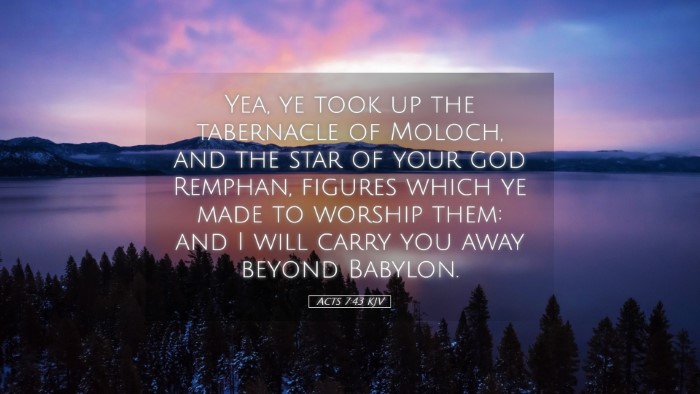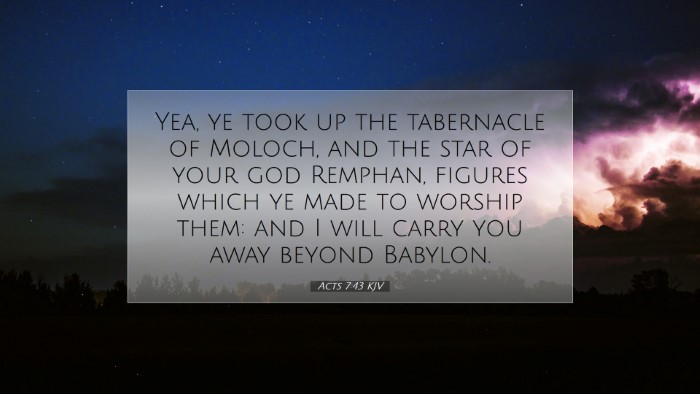Commentary on Acts 7:43
Acts 7:43 states, "Yea, ye took up the tabernacle of Moloch, and the star of your god Remphan, figures which ye made to worship them: and I will carry you away beyond Babylon." This verse is part of Stephen's defense before the Sanhedrin, where he recounts Israel's history and the consequences of their unfaithfulness to God.
Contextual Background
Matthew Henry emphasizes the historical context of Stephen's speech, which serves not only as a defense but as a powerful assertion of God's covenant with His people. Stephen highlights the pattern of Israel's disobedience throughout history, signaling their tendency to forget God's revelations and turn to idolatry.
Understanding Moloch and Remphan
- Moloch: Moloch was a Canaanite god associated with the practice of child sacrifice. The Israelites' adoption of Moloch worship signifies their gross departure from Yahweh.
- Remphan: Remphan is possibly linked to the worship of celestial bodies, indicating that the Israelites turned to the worship of stars and planets, which was a common practice among surrounding pagan cultures.
Albert Barnes points out that the reference to these idols serves to illustrate Israel's profound spiritual blindness and rebellion against God. Here, Stephen summarizes their idolatry, demonstrating that they have exchanged the glory of the true God for false images crafted by their own hands.
The Implications of Idolatry
Stephen's indictment of Israel's idolatry serves as a warning for his audience. Adam Clarke elaborates on the psychological implications of idolatry, noting that worshiping created things leads individuals away from God’s truth. The act of worshipping Moloch and Remphan reflects a heart that is not aligned with divine purpose.
Spiritual Blindness
Barnes illustrates that this spiritual blindness was not merely a historical fact but a living reality among Stephen's contemporaries. Just as the Israelites turned their back on God while in the wilderness, the same rejection is present among the religious leaders of Stephen's time.
Consequences of Idolatry
The phrase "I will carry you away beyond Babylon" signifies the severe consequences of such rebellion. Matthew Henry suggests that this could reference the impending exile, a direct result of their unfaithfulness. This warning echoes the prophetic declarations found throughout the Old Testament regarding idolatry and its consequences.
Lessons for Believers
This verse serves as a solemn reminder for modern believers. Clarke asserts that while the contexts have changed, the principles and consequences of straying from God remain constant. Christians today must guard against idolatry, which can take many forms: materialism, self-worship, and the elevation of worldly concerns above spiritual truths.
Identifying Modern Idols
- Materialism: The pursuit of wealth and possessions can become a new form of idol worship.
- Self: Prioritizing personal desires and ambitions over God's calling can lead to spiritual ruin.
- Technology and Entertainment: The excessive focus on these aspects of life may distract from one’s devotion to God.
Conclusion
Acts 7:43 serves as a powerful call to reflection for believers and religious leaders alike. By examining the historical disobedience of Israel, we are prompted to evaluate our own faithfulness to God. As Clarke and Henry articulate, the lessons learned from Stephen’s bold declaration are not only relevant for understanding the early church but also as a guiding principle for how we worship and honor God today.
To remain in the true worship of God, we must continuously evaluate the idols that may creep into our lives and ensure that our allegiance resides firmly with the Creator, steering clear of the paths that lead to spiritual exile.


